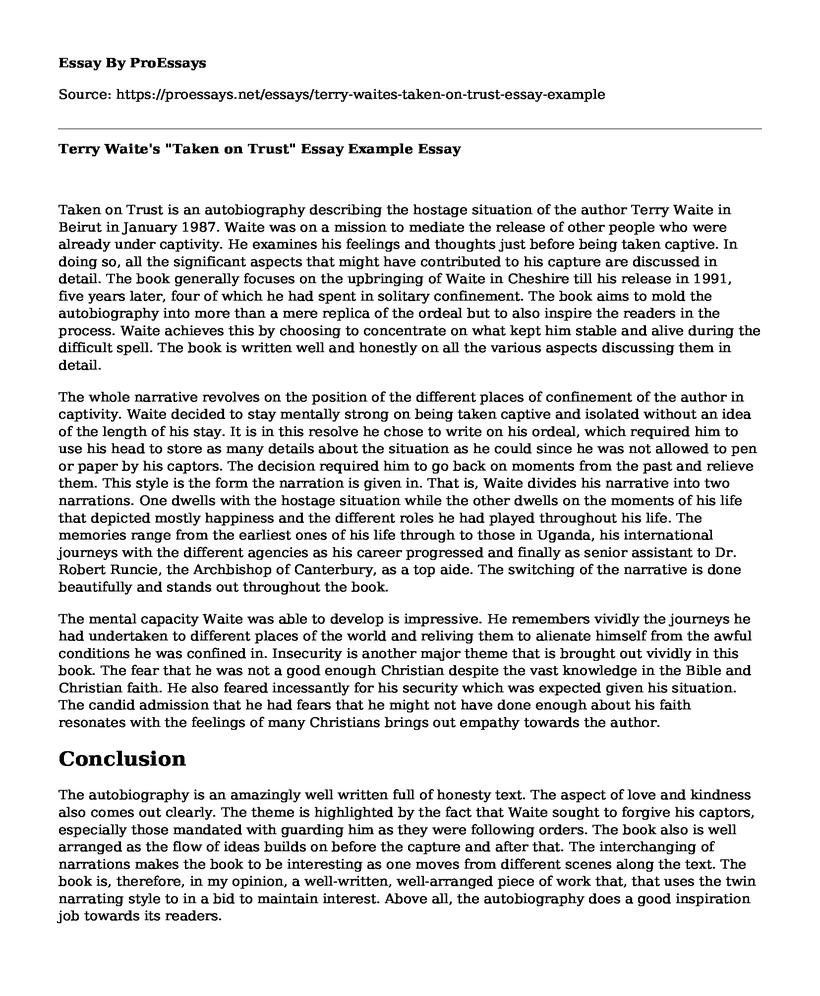Taken on Trust is an autobiography describing the hostage situation of the author Terry Waite in Beirut in January 1987. Waite was on a mission to mediate the release of other people who were already under captivity. He examines his feelings and thoughts just before being taken captive. In doing so, all the significant aspects that might have contributed to his capture are discussed in detail. The book generally focuses on the upbringing of Waite in Cheshire till his release in 1991, five years later, four of which he had spent in solitary confinement. The book aims to mold the autobiography into more than a mere replica of the ordeal but to also inspire the readers in the process. Waite achieves this by choosing to concentrate on what kept him stable and alive during the difficult spell. The book is written well and honestly on all the various aspects discussing them in detail.
The whole narrative revolves on the position of the different places of confinement of the author in captivity. Waite decided to stay mentally strong on being taken captive and isolated without an idea of the length of his stay. It is in this resolve he chose to write on his ordeal, which required him to use his head to store as many details about the situation as he could since he was not allowed to pen or paper by his captors. The decision required him to go back on moments from the past and relieve them. This style is the form the narration is given in. That is, Waite divides his narrative into two narrations. One dwells with the hostage situation while the other dwells on the moments of his life that depicted mostly happiness and the different roles he had played throughout his life. The memories range from the earliest ones of his life through to those in Uganda, his international journeys with the different agencies as his career progressed and finally as senior assistant to Dr. Robert Runcie, the Archbishop of Canterbury, as a top aide. The switching of the narrative is done beautifully and stands out throughout the book.
The mental capacity Waite was able to develop is impressive. He remembers vividly the journeys he had undertaken to different places of the world and reliving them to alienate himself from the awful conditions he was confined in. Insecurity is another major theme that is brought out vividly in this book. The fear that he was not a good enough Christian despite the vast knowledge in the Bible and Christian faith. He also feared incessantly for his security which was expected given his situation. The candid admission that he had fears that he might not have done enough about his faith resonates with the feelings of many Christians brings out empathy towards the author.
Conclusion
The autobiography is an amazingly well written full of honesty text. The aspect of love and kindness also comes out clearly. The theme is highlighted by the fact that Waite sought to forgive his captors, especially those mandated with guarding him as they were following orders. The book also is well arranged as the flow of ideas builds on before the capture and after that. The interchanging of narrations makes the book to be interesting as one moves from different scenes along the text. The book is, therefore, in my opinion, a well-written, well-arranged piece of work that, that uses the twin narrating style to in a bid to maintain interest. Above all, the autobiography does a good inspiration job towards its readers.
Works Cited
Waite, Terry. Taken on Trust. London: Hodder & Stoughton, 2016. Print.
Cite this page
Terry Waite's "Taken on Trust" Essay Example. (2022, Sep 22). Retrieved from https://proessays.net/essays/terry-waites-taken-on-trust-essay-example
If you are the original author of this essay and no longer wish to have it published on the ProEssays website, please click below to request its removal:
- Environments That Shaped Lakshmi's Life
- Harriet Jacob's Slave Narrative Essay
- Shout by Dagoberto Gilb Essay
- Critical Essay on The Scarlet Letter: Analysis of Pearl and How She Functions
- Essay Example on Dr. Seuss & Shel Silverstein: Poetry for Children
- Essay Example on The Human Stain: Identity, Change, and Freedom
- Essay Example on Exploring the Depths of Robert Macfarlane's 'Underland': Red Dancers in Lofoten







